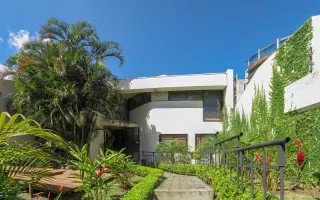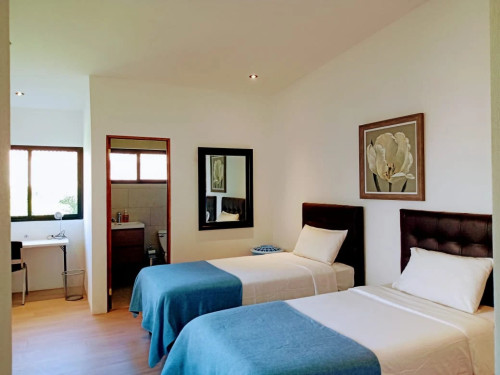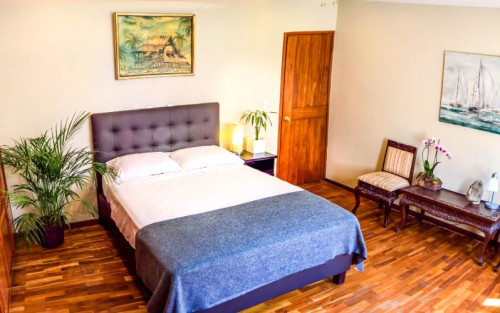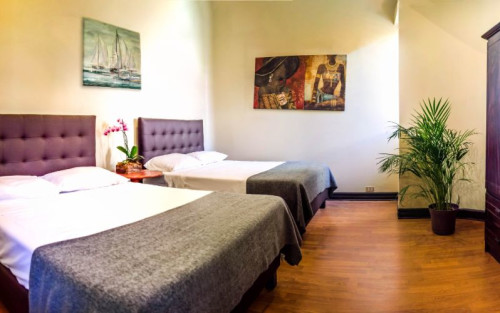






Costa Rica Treatment Center San Jose
Treatment Focus
This center treats substance use disorders and mental health conditions. You'll receive individualized care catered to your unique situation and diagnosis, learn practical skills for recovery, and make new connections in a restorative environment.
Primary Level of Care
Offering intensive care with 24/7 monitoring, residential treatment is typically 30 days and can cover multiple levels of care. Length can range from 14 to 90 days typically.
Claimed
Recovery.com has connected directly with this treatment provider to validate the information in their profile.
Treatment Focus
This center treats substance use disorders and mental health conditions. You'll receive individualized care catered to your unique situation and diagnosis, learn practical skills for recovery, and make new connections in a restorative environment.
Primary Level of Care
Offering intensive care with 24/7 monitoring, residential treatment is typically 30 days and can cover multiple levels of care. Length can range from 14 to 90 days typically.
Private Pay
You pay directly for treatment out of pocket. This approach can offer enhanced privacy and flexibility, without involving insurance. Exact costs vary based on program and length of stay. Contact the center for specific details.
Costa Rica Treatment Center San Jose
Costa Rica Treatment Center San Jose
About Costa Rica Treatment Center San Jose
Costa Rica Treatment Center (CRTC) offers comprehensive dual diagnosis care in stunning Costa Rica, featuring a unique 4-phased approach to healing: stabilization and planning, intensive treatment, transferring responsibility, and reintegration. This method guides clients through recovery with hands-on support, even as they help clients take accountability for their progress and apply coping skills to their daily lives.
Structured Programs Focused on Relapse Prevention
CRTC offers 30, 60, 90 and 120-day residential programs including medical detox and structured sober living options in Costa Rica. They also provide an intensive outpatient program (IOP) for Costa Rican residents. Alongside treating various substance addictions, CRTC addresses mental health conditions such as anxiety and depression, offering services in both English and Spanish.
CRTC’s 120-day, 4-phase residential program offers a comprehensive recovery approach. Phase 1 includes medical and psychiatric evaluations, detoxification, and stabilization. Phase 2 addresses underlying issues through various therapies and holistic treatments. In phase 3, clients take more responsibility for their recovery, focusing on reintegration and personal development. The final phase emphasizes reintegration into daily life, with clients designing their recovery plans and establishing healthy routines, supported by ongoing monitoring.
CRTC guarantees that if a relapse occurs within 6 months of discharge, clients receive an additional 30-day stay at no extra cost. Eligible clients must have completed the program and been discharged in good standing.
Holistic Therapy Approach
During recovery, clients work closely with a team of accredited staff, including physicians, psychologists, and recovery specialists. They engage in individual, group, and family therapy. CRTC offers cognitive behavioral therapy (CBT), rational emotive behavioral therapy (REBT), spiritual counseling, 12-Step meetings, and relapse prevention. CRTC aims to heal the mind, body and spirit, and provides holistic therapies. These include yoga, guided meditation, art therapy, and forest therapy, which involves a slow, gentle walk through the forest and a ceremony with a nature guide.
Safely Heal and Reintegrate into Society
CRTC’s San Jose location provides a more central, urban environment that gives easy access to medical care facilities and other resources. Their strategic location helps individuals engage with the "real world" while in treatment to prepare for successful long-term recovery. This home has shared or private bedrooms, updated furnishings, a yoga and meditation area, and private courtyards. CRTC incorporates excursions such as golfing, swimming, beach trips, hiking, and volcano sightseeing into clients’ treatment schedules.

Center Overview
Treatment Focus
This center treats substance use disorders and mental health conditions. You'll receive individualized care catered to your unique situation and diagnosis, learn practical skills for recovery, and make new connections in a restorative environment.
Pricing and Program Length
Estimated Center Costs
The cost listed here ($8,950-$9,950/month), is an estimate of program cost. Center price can vary based on program and length of stay. Contact the center for more information. Recovery.com strives for price transparency so you can make an informed decision.




Levels of Care







Your Care Options
Specializations
Alcohol
Using alcohol as a coping mechanism, or drinking excessively throughout the week, signals an alcohol use disorder.
Anxiety
Anxiety is a common mental health condition that can include excessive worry, panic attacks, physical tension, and increased blood pressure.
Co-Occurring Disorders
A person with multiple mental health diagnoses, such as addiction and depression, has co-occurring disorders also called dual diagnosis.
Depression
Symptoms of depression may include fatigue, a sense of numbness, and loss of interest in activities. This condition can range from mild to severe.
Drug Addiction
Drug addiction is the excessive and repetitive use of substances, despite harmful consequences to a person's life, health, and relationships.
Who We Treat
Men and Women
Men and women attend treatment for addiction in a co-ed setting, going to therapy groups together to share experiences, struggles, and successes.
Approaches
Evidence-Based
A combination of scientifically rooted therapies and treatments make up evidence-based care, defined by their measured and proven results.
Holistic
A non-medicinal, wellness-focused approach that aims to align the mind, body, and spirit for deep and lasting healing.
Personalized Treatment
The specific needs, histories, and conditions of individual patients receive personalized, highly relevant care throughout their recovery journey.
Therapies
1-on-1 Counseling
Patient and therapist meet 1-on-1 to work through difficult emotions and behavioral challenges in a personal, private setting.
Meditation & Mindfulness
A practiced state of mind that brings patients to the present. It allows them to become fully aware of themselves, their feelings, and the present moment.
Mindfulness Therapy
This ancient practice can be mental, emotional, and even spiritual. In meditation, you focus your attention on the present moment without judgement.
Art Therapy
Visual art invites patients to examine the emotions within their work, focusing on the process of creativity and its gentle therapeutic power.
Family Therapy
Family therapy addresses group dynamics within a family system, with a focus on improving communication and interrupting unhealthy relationship patterns.
Life Skills
Teaching life skills like cooking, cleaning, clear communication, and even basic math provides a strong foundation for continued recovery.
Motivational Interviewing and Enhancement Therapy (MET)
This approach is based on idea that motivation to change comes from within. Providers use a conversational framework that may help you commit to recovery.
Psychoeducation
This method combines treatment with education, teaching patients about different paths toward recovery. This empowers them to make more effective decisions.
Conditions We Treat
Anxiety
Anxiety is a common mental health condition that can include excessive worry, panic attacks, physical tension, and increased blood pressure.
Depression
Symptoms of depression may include fatigue, a sense of numbness, and loss of interest in activities. This condition can range from mild to severe.
Substances We Treat
Alcohol
Using alcohol as a coping mechanism, or drinking excessively throughout the week, signals an alcohol use disorder.
Benzodiazepines
Benzodiazepines are prescribed to treat anxiety and sleep issues. They are highly habit forming, and their abuse can cause mood changes and poor judgement.
Co-Occurring Disorders
A person with multiple mental health diagnoses, such as addiction and depression, has co-occurring disorders also called dual diagnosis.
Cocaine
Cocaine is a stimulant with euphoric effects. Agitation, muscle ticks, psychosis, and heart issues are common symptoms of cocaine abuse.
Drug Addiction
Drug addiction is the excessive and repetitive use of substances, despite harmful consequences to a person's life, health, and relationships.
Ecstasy
Ecstasy is a stimulant that causes intense euphoria and heightened awareness. Abuse of this drug can trigger depression, insomnia, and memory problems.
Heroin
Heroin is a highly addictive and illegal opioid. It can cause insomnia, collapsed veins, heart issues, and additional mental health issues.
Methamphetamine
Methamphetamine, or meth, increases energy, agitation, and paranoia. Long-term use can result in severe physical and mental health issues.
Languages
Aftercare
Care Designed for Your Needs
Personal Amenities
Amenities
Special Considerations
Flexible technology policies
Centers with flexible technology policies allow professionals to stay in touch with work and give patients a greater sense of connection and normalcy.
Activities
Yoga
Yoga is both a physical and spiritual practice. It includes a flow of movement, breathing techniques, and meditation.
Off-Site Activities
Off-Site Amenities
What people are saying
Treatment
5.0
Accommodations
5.0
Food & Nutrition
5.0
Value
5.0
P.D.
Treatment in 2022 • (30 days) • Reviewed 04/12/23
Former Client
•Advance Bodywork Therapist
•U.S.A






